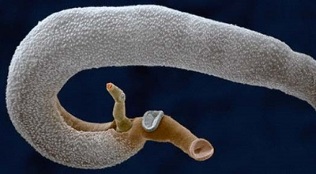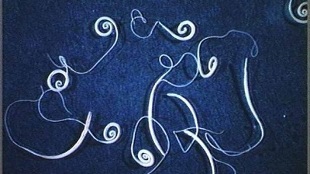Helminths are parasitic worms. To do this, they use the intermediate and primary hosts, consuming cells or tissues, absorbing nutrients and vitamins that enter the body for the host. Worms in the human stomach, as well as intestines or other tissue structures, during their vital activity, poison the body with toxic substances.
Types of parasites that enter the body through the stomach
Each type of parasite can develop in an existing part of the human body, where the best conditions for reproduction and nutrition are created. Certain types of parasites can travel through the body from organ to organ. Infection with parasites occurs in a variety of ways. The most common method of parasite penetration into the human body is food. You can avoid problems by following the basic rules of hygiene - washing your hands before eating food, and even handling food carefully.
Parasites do not live long in the human stomach due to the effects of hydrochloric acid on its membranes. The most common alien microorganisms that parasite the human body are:
- Ascaris- has the ability to travel through the hepatic and lung structural channels, permeating into the intestine. In the small intestine, ringworm develops into sexually mature individuals.
- Schistosomes- affects liver tissue, in advanced cases, which provokes the development of oncological diseases and dystrophy of the hepatobiliary system.
- Worm worms- causes disorders of the digestive tract. The most dangerous for the human body are worms and caregivers. Localization of parasites especially in the duodenum. Worms can enter the human body not only through the stomach. Parasites have the ability to invade the skin, causing allergic reactions in the form of itching, burning and redness.
- Toxoplasma- the simplest parasite that often affects the human body. The disease progresses easily, often invisible to humans. Serious consequences for the body only arise if the immunity is weak.
- Wide tapeworm- localized in small parts of the human intestine. Its length can reach several meters. Parasites provoke the development of cyanocobalamin deficiency (vitamin B12), as well as folic acid. Toxic-allergic reactions of the body are not excluded. Infection occurs while eating fish that are exposed to larvae.
- Bovine tapewormis a worm that provokes the development of diseases such as teniarinchiasis. Penetrating into the human body by digestion, the parasite of the tapeworm passes through the stomach, where it removes the membrane under the action of gastric juice. The sucker is released and the parasite easily attaches to the mucous membrane of the small intestine. Signs of tapeworm worms in the body are abdominal pain, nausea and gastric contents eruption. Patients lose appetite, may suffer from dyspeptic disorders (e. g. , belching). In some cases, infection with the cowhide is a manifestation of an allergic reaction to the skin in the form of urticaria.
- Pig tapewormis a helminth measuring up to 10 meters. It belongs to one of the largest worms that infects the human body. Through the stomach, the parasitic egg, due to the action of hydrochloric acid, loses its shell. Larvae that come out of the egg spread throughout the tissues of the human body, provoking the development of cysticercosis. Cysticercosis poses the greatest danger to the nervous system.
- Vlasoglavis a roundworm that causes trichocephalosis. Symptoms of aggression may not exist for a long time. In complicated cases, with a large accumulation of parasites, signs of ulcerative colitis or Crohn’s disease may occur. The person suffers from stomach pain, decreases appetite, and stools become liquid. On the stool, there are lines of blood and mucus.


Symptoms of parasites and worms in the gastrointestinal tract
The alien organism that undergoes a parasitic lifestyle in its host body disrupts the function of many organs, causing inflammatory processes and severely destroying body tissues.
Individual parasites in the intestinal tract, for their development and reproduction, use nutrients from foods intended for the host. The consequences for human beings are indeed sad. The body suffers from severe trace elements and vitamin complexes.
The most vulnerable child organisms.
Against the background of severe helminthiasis, normal growth and development processes, both physically and psychologically, are seriously disrupted. Helminths have the ability to adapt perfectly and live for decades in the host body. Worm eggs have significant resistance to environmental factors.
Being in the digestive tract, various types of helminthiases can disrupt the digestive process by releasing toxic substances specifically for its protection, paralyzing enzymatic activity. Helminthiasis can cause gastritis and other dyspeptic disorders.
Symptoms that appear during infection with parasites can vary greatly in their manifestations. In a large number of clinical cases, discomfort and painful sensations are observed at the location of the parasite. Thus, helminths, whose habitat is the skin, damage the dermis, causing the appearance of allergic reactions. Parasites found in the lung structure can cause an annoying cough or shortness of breath. Symptoms of dwarf tapeworm infection are indicated by weakness throughout the body, memory impairment, pain in the abdomen and head. Occasionally persistent nausea and vomiting are diagnosed, such as stomach ulcers.
Stool disorders, bad breath, painful sensations in the intestine or digestive disorders are, in most cases, associated with the action of parasites in the gastrointestinal tract.
The effects of foreign microorganisms on the human body as a whole lead to the following symptoms:
- increased vulnerability;
- headache attacks;
- insomnia;
- bloated;
- rash and itching on allergic skin;
- bronchial asthma attacks.
In addition, overall immunity decreases, against the background of changes in immune system function. In young children, helminthiasis is indicated by a delay in physical and psychological development.
Diagnostics
Diagnostics combine studies to identify larvae or worm eggs.
The biological material for diagnosis is:
- tinja;
- urine;
- sputum;
- duodenal contents;
- bile duct secretion;
- as often as the rectum;
- smear from perianal space;
- muscle fibers;
- blood.
Based on the fact that helminths and their particles are detected by macroscopic methods, eggs and larvae can only be detected by laboratory examination using a microscope.
The acute phase of helminthiasis caused by parasites in tissues, or by larvae form parasitic toxocariasis, trichinosis, cystocerciasis, trichocephallosis, implies the use of serological samples, such as:
- RSK- complete the binding reaction;
- HA- indirect merging;
- ELISA- immunofluorescence analysis;
- AHL- lysis unification.
In some cases of helminthiasis, a reliable diagnosis can only be made with the help of special ultrasound examination, computed tomography, X-ray examination and using endobiopsy.
Treatment
Treatment for helminthiasis can vary. Science knows more than 300 types of helminthiases, but the main parasites that cause systemic changes and intoxication are round and bloated worms. They are usually divided into intestines and not intestines. When prescribing therapeutic measures, it is important to take into account a number of special features that are only characteristic of certain classes of helminths that are harmful to human health.
To get rid of helminths, specialists prescribe an overall treatment regimen, and it is important to consider the factors of the frequency of infection of certain organs, the intensity of infection, the degree of intoxication, and the duration of helminthos. This allows you to set the most effective method.
Medicine
To combat the type of helminths diagnosed, individual therapeutic regimens are being developed. The specialist will prescribe the appropriate medication based on the patient's test results.
People's solution
Traditional medicine can help you get rid of parasites at home.
For the treatment of helminthiasis, you can use the following recipe:
- Flowering of wormwood seeds,must be ground and mixed with honey. Take the drug 3 days in a row 3 times a day, 1 tsp. Effective for ascariasis.
- Infusion of bitter worm woodis prepared as follows - grind the grass, pour boiling water over it, leave overnight. In the morning, strain the infusion and drink 3 times a day. The course of treatment is up to 3 weeks. Effective for ascariasis and enterobiasis.
- Pumpkin seeds.They can be used raw, dried, or as a powder. The powder is mixed with honey and the medicine is taken on an empty stomach. Stamp with tapeworm. You can make a decoction of pumpkin seeds. One pound of seeds is crushed in a mortar, poured with 1. 5 liters of hot water and put in a water bath. No need to boil. Drink the broth on an empty stomach.
- Absorption of pomegranate skin.Dried and crushed pomegranate skin, pour boiling water, cool and take 1 teaspoon 3-4 times a day. The course of therapy is 7 days.
Precautions
If personal hygiene rules are not followed, parasites should be removed from the body continuously, which will adversely affect the condition of the body as a whole.
For preventive purposes, it is important to adhere to the following basic hygiene rules:
- avoid close contact with animals;
- keep hands clean - wash after each;
- It is important to keep the living room clean, do wet cleaning, wash dishes with detergent;
- if there are children in the house, it is recommended to wash children's toys with soap, especially after a walk;
- wash vegetables and fruits under running water, preferably warm or hot, as worm eggs have a sticky substance that prevents them from separating from the surface;
- eat meat and fish products only after initial heat treatment;
- drink clean water, avoid tap water, as it may contain lamblia and schistosoma.
Helminthiases not only cause discomfort, but also harm the human body. Neglected cases of helminth damage cause dysfunction of the whole organism. It is important to take timely preventive measures to prevent infection.




























